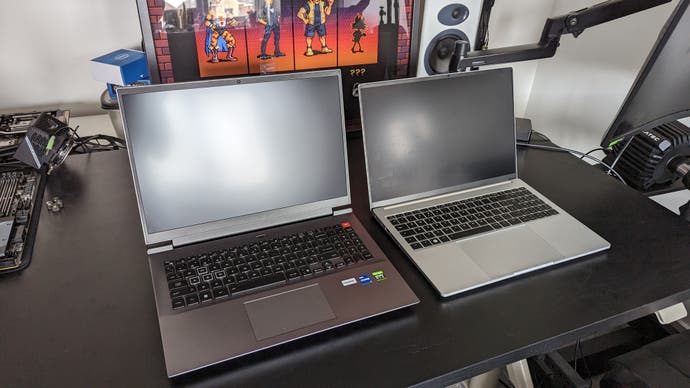RTX 3060 laptops are everywhere - but just how fast are they?
An impressive showing on all accounts.
With our testing complete, both RTX 3060 laptops have acquitted themselves well, delivering much closer performance to a desktop RTX 3060 card than I would have thought possible - sometimes even beating our Core i9 12900K-equipped test rig. Having only 6GB of VRAM is a bit of a constraint verus the 12GB desktop card, in a world where even 8GB GPUs are hampered in recent multi-platform releaes like The Last of Us Part 1 and Forspoken, but for the majority of games this is a surprisingly capable GPU.
With the continuing growth of flagship-grade desktop graphics cards in both physical size and power consumption, it's easy to forget that more modern manufacturing processes, smarter architectures and frame-rate boosting technologies like DLSS upscaling have had a transformative impact on mid-range laptop GPUs. These machines offer better performance than even high-end desktop parts from just a few years ago, and the thought that a AAA game would be playable with full path-tracing - even at 1080p30 - would have been unthinkable back then.
In terms of these specific machines, there's plenty to like about both options. The Chillblast Defiant isn't particularly svelte, but the impact its thicker chassis and more advanced thermal solution has on outright performance is clear to see from our testing, often butting up against desktop-level performance. For a machine you can tuck into a backpack for LAN parties or trips away from home, this is a seriously impressive piece of kit. The fast CPU, high-res 16:10 screen and serviceable keyboard and trackpad also make this a good choice for content creators, which I appreciated when working away from home.

Despite getting a lot right, there are some annoyances with the Defiant too. The inclusion of 'Norton 360 for Gamers' is a real drag, popping up after every boot even after I attempted to uninstall it, and the default fan/performance profile could benefit from tuning - even installing Windows updates or downloading games from Steam could result in a concerning amount of fan noise. I also know that the gamer-y look isn't one that appeals to everyone, but I can deal with massive fan grilles, some RGB accents and highlighted WASD keys on the keyboard... just change the keyboard font to something a bit more elegant and readable, please!
As good as the Defiant was, the Tuxedo InfinityBook 16 was my favourite of the two options. Its slimmer chassis incurs a performance penalty - unless you're willing to put up with absolutely ridiculous levels of fan noise - but the metal chassis looks better, weighs less and takes up less space too, so I actually wanted to take it with me more often. The keyboard and trackpad seemed better designed too, with a much larger trackpad that had better palm rejection. However, the high refresh rate screen and slightly smaller battery meant that longevity was not great, at around six hours even on light tasks in Windows.
Being able to get the InfinityBook Pro with Linux instead of Windows is a great option, as it cuts down the cost of the machine and is exactly what you'd likely want for programming, scientific computing and the like. Of course, you'd also be free to install Windows later, either replacing the Linux installation, repartioning or adding a new NVMe drive to the free M.2 slot to dual-boot both operating systems. This means a fresh Windows installation with no pre-installed guff, but I did note some oddities - including a fan profile that seemed to oscillate annoyingly between two speeds and a crackle whenever a sound started to play if the machine that been silent for a while.
These minor complaints aside, both machines were impressive performers and worth considering against more mainstream names if you're in the market for a gaming laptop of this power class. The Chillblast machine is currently discounted to £1249 at CCL, making it an even better buy, while the Tuxedo machine remains at RRP but offers greater customisation.
No matter which you choose, I was sincerely impressed by the strength of the experience - even mid-range gaming laptops these days are much less compromised than earlier models in terms of performance, usability, visuals and flexibility. I'm happy to recommend both options - and happy to answer your questions below if you have them!
